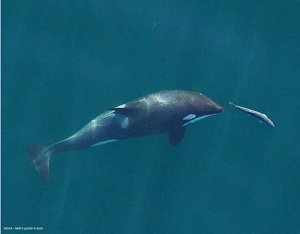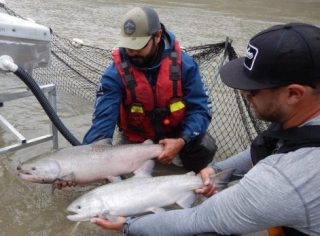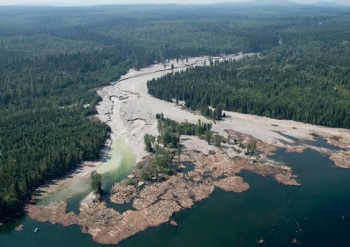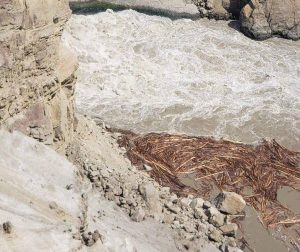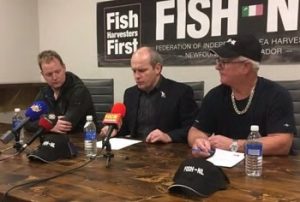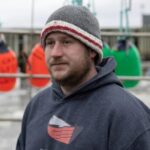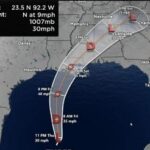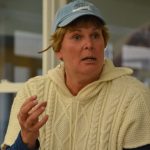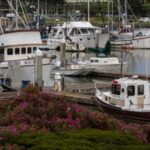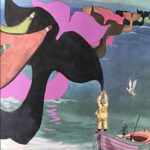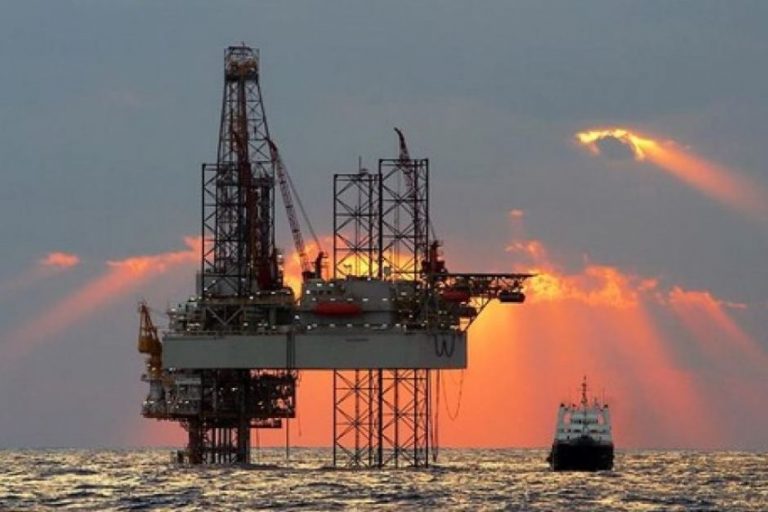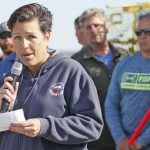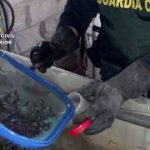Tag Archives: British Columbia
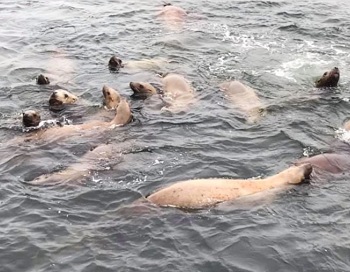
FurCanada open house will kickstart campaigns for a seal, sea lion and sea otter commercial fishery in British Columbia
The fur is set to fly in Nanaimo this weekend, with an open house to kickstart campaigns for a seal, sea lion and sea otter commercial fishery in British Columbia. FurCanada, a Vancouver Island company, hopes the event on Dec. 14, will raise awareness about the overpopulation of seal and sea lions which are decimating B.C.’s endangered and threatened chinook salmon stocks. Thomas Sewid, who is President of Pacific Balance Marine Management, which is the organization leading the development of the seal, sea lion and sea otter industry estimates that of the 27 million chinook smolts produced a year in the Salish Sea (wild and hatchery) the pinnipeds are consuming about 24 million of them. >click to read< 19:53
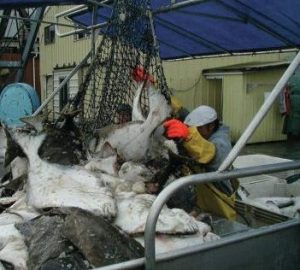
Halibut bycatch increases as council considers cod options
Data released preceding the International Pacific Halibut Commission’s upcoming interim meeting shows that almost all the regulatory areas of Alaska from Southeast to the Bering Sea — areas 2C through 4E, respectively — caught more halibut as bycatch in the 2019 season than they did in 2018, with the exception of area 4B, which covers the western Aleutian Islands. Coastwide, from California and British Columbia through the Bering Sea, bycatch increased by more than 1.5 million pounds,,, >click to read< 15:48

Dear editor: Government going overboard with Marine Protected Areas
The B.C. economy is set to lose hundreds of millions of dollars and few seem to be aware or care about this issue. The issue is the establishment of Marine Protected Areas (MPAs). Few would argue that MPAs can be beneficial, even commercial fishermen.,,, These B.C. fishermen work on the principle of sustainable yield,,,An estimate of the loss to the northern shelf alone ( north of Port Hardy) is $100 million per year! by George Dennis,
Comox >click to read< 15:20
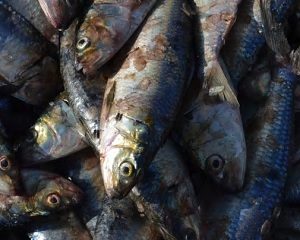
B.C. seafood company pleads guilty to illegally importing fish into the U.S.
A British Columbia seafood seller has admitted to illegally importing into the U.S. thousands of pounds of fish that were deemed unsafe to eat.
Seven Seas Fish Company, a seafood wholesaler based in Richmond, B.C., and its owner, John Heras, pleaded guilty in court in Seattle, Wash., on Friday. According to the U.S. Department of Justice, the fish — which had been purchased in Mexico — had previously been rejected from entering the United States during an inspection. >click to read< 09:35
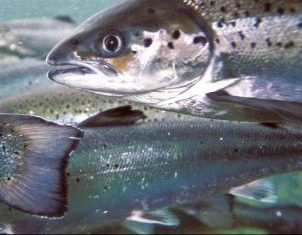
Stewart Lamont, Tangier: Finally! Salmon feedlots fall victim to federal election
Events are developing quickly. The federal Liberals and the Greens have made a pre-election pledge in British Columbia to transition from open-net pen feedlot fish to on-land closed containment only, by 2025. This policy advisory, issued 16 short days before a federal election, changes absolutely everything. It came out of the blue, and both parties are to be heartily congratulated. You and I might ask why the same commitments are not being made here in Atlantic Canada. >click to read< 12:46

Federal Liberals treat East Coast fishery as ‘second class’; move to ban at-sea fish farms off BC, but not eastern Canada?
The Federation of Independent Sea Harvesters of Newfoundland and Labrador (FISH-NL) accuses the Liberal Party of Canada of talking out of both sides of its mouth for promising to phase out at-sea salmon farms in British Columbia while ignoring Eastern Canada. “The impact of open-pen aquaculture is the exact same on both coasts, with the same companies reportedly operating on both ends of the country, but the Liberal policy is strictly for the West Coast,” says Ryan Cleary, President of FISH-NL. “How does that make sense? How is that fair? Do the Liberals consider the East Coast fishery a second-class industry?” >click to read< 14:41
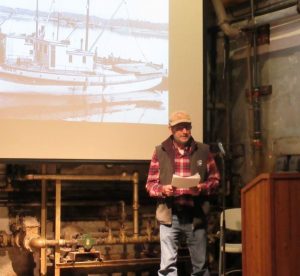
Fisher Poets return to Steveston’s Gulf of Georgia Cannery
The call of the sea, the river and fishing all serve as the source of inspiration for the poets presenting at this weekend’s Fisher Poets at the Gulf of Georgia Cannery. On Saturday Sept. 28, current and retired members of the West Coast commercial fishing industry will share their poetry, prose and songs in the Gulf of Georgia Cannery’s Boiler House Theatre. >click to read< 12:19 The Fisher Poets Afternoon will run from 2 p.m. to 3:30 p.m. on Saturday, Sept. 28.
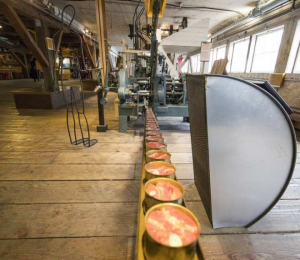
Celebrating 100 years of canning salmon
Greg Smith’s father always told him one thing: Whatever you do, don’t get into the fishing industry. Like any self-respecting teenager, Smith didn’t listen. He grew up slinging salmon alongside his father, who worked in fisheries up and down the west coast, and his grandfather, who ran the Kildonan fish processing plant. Now vice-president of business development for Gold Seal, a B.C. brand celebrating its 100th anniversary, Smith vividly remembers his youth working “the slime line” in B.C.’s canneries. >click to read< 09:56
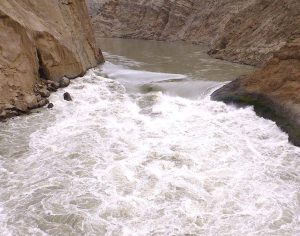
Salmon collapse hitting workers hard
Don Sananin has loved the sea and fishing since he started in the industry as a 17-year-old.,,,But after more than 50 years working as a commercial fisherman, the Burnaby man hasn’t seen a salmon season as grim as this year’s. Sananin, 70, who holds a licence for the area that includes the Fraser River to the west coast of Vancouver Island, hasn’t been out on the water yet. “There hasn’t been an opening,” he said. “The sockeye is the worst it’s ever been since the 1890s.”,,, “The impacts are on fishermen, plant workers, net menders, and reduction plant workers, from Lax Kw’alaams [in northern B.C.] all the way down to White Rock and all the places in between.” >click to read< 17:21
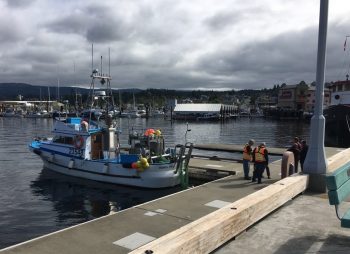
Port Alberni fisherman found dead after getting caught in net remembered as ‘hardworking and honest’
Family members have identified a fisherman who died in the water off Port Alberni early Wednesday morning. The man who died was Son Ho and his daughter released this statement Wednesday afternoon. “My dad was an honest, hardworking and beautiful person who cared so much for those around him. He gave all he could to those around him and never asked for anything in return. He taught us how to be good people through his actions. We love him so much and we will miss him with all of our hearts.” >click to read< 19:46
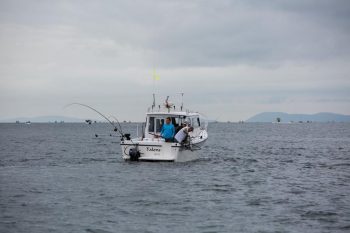
First Nations along Fraser River want sport fishing closed to save at risk species
So far this season, Guerin said Fisheries and Oceans Canada (known as DFO) limited Musqueam fishers to a few hundred chinook from the river, nowhere near enough to feed the nation’s 1,300 members let alone supply funerals and other community events like ceremonies and feasts. “I’ve got elders this year, this may be their last fish, and I can’t give it to them,” he said. “That hurts.”,,, Musqueam Chief Wayne Sparrow said they want to be part of the conservation efforts, but First Nations’ needs take priority over recreational fishing according to a 1990 Supreme Court ruling. That means the sport fishery should bear the brunt of any restrictions when there are concerns about the state of salmon populations. >click to read< 08:50
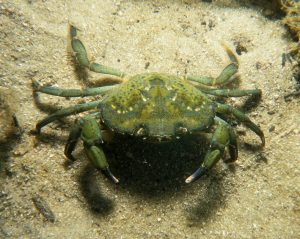
Transported in ship ballast, Invasive crab poses threat to coastal ecosystem
Alaska normally welcomes European tourists. One traveler who’s been officially banned, however, is the European green crab, an invasive species with the potential to overrun coastal ecosystems. The green crab has already colonized Washington and parts of British Columbia, and conservationists want to delay its arrival in Alaska for as long as possible. The green crab lacks predators outside its original habitat,,, >click to read< 20:35
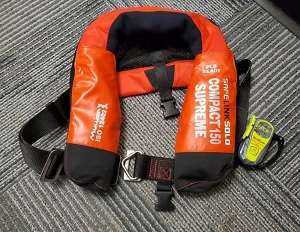
N.L. regulators watching closely as B.C. requires life jackets on fishing vessels
Fishers in British Columbia now have a clear directive when it comes to life jackets: they must be worn on decks of fishing vessels. That regulation change is getting attention in Newfoundland and Labrador.,,, The amended regulation in B.C. has safety advocates in Newfoundland and Labrador talking. >click to read< 10:37
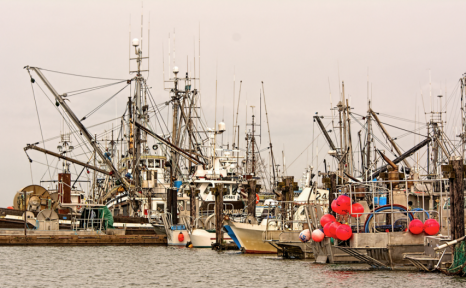
Sweeping reforms to West Coast fisheries recommended
Canada’s West Coast fishery could be in for a sea change, if Parliament accepts and implements 20 recommendations being made by the Standing Committee on Fisheries and Oceans.,,, recommending sweeping changes to the way commercial fishing licences and quota are owned in B.C.,,, including quota ownership by foreign investors who may never have set foot on a fishing boat or in Canada – that has turned commercial fishing in B.C. into “a modern day feudal system.” “The direction that the industry is going is driving the independent harvester – the small boat fisherman, the Ma and Pa operations – out of business on the coast.” The ownership of licences and quota in B.C. is different from Atlantic Canada and Alaska, where the people who do the fishing – commercial boat owners – tend to own the licences and quota. >click to read<23:14
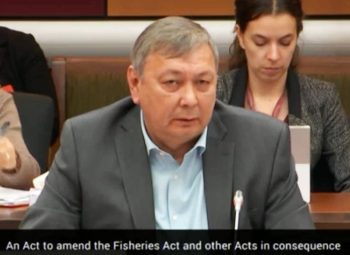
Bill C-60: Reviewing the Fisheries Act – B.C. North Coast residents to Ottawa: ‘We can’t make a living fishing’
Lax Kw’alaams Band Mayor John Helin called for more consultation as he painted a grim picture,,,“In my community we have a fleet of 70-80 gillnetters that can’t make a living,,, Prince Rupert resident, Chelsey Ellis,,, Ellis grew up on the East Coast, where she’s seen the benefits of the owner-operator policy for fish harvesters. In her statement, she said this is not the same in British Columbia, where there has been a steady increase of licenses and quota being transferred from fishermen and away from coastal communities.>click to read<15:44
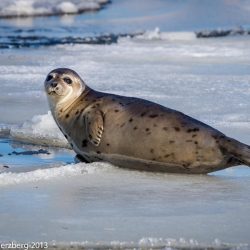
FISH-NL pleased with DFO move to increase seal licences; first step in addressing population
The Federation of Independent Sea Harvesters of Newfoundland and Labrador (FISH-NL) is encouraged that Fisheries and Oceans has finally moved to increase the number of — the first step to combating the massive population. DFO issued an advisory to harvesters earlier today to say that new applications for commercial assistant sealers will be considered.,,, The Harp seal population in the northwest Atlantic was last estimated in 2012 at 7.4 million animals — almost six times what it was in the 1970s.,,, Groups in British Columbia have called for a cull of the estimated 110,000 harbour seals and sea lions off that province for the impact they’re having on Pacific salmon stocks. >click to read<16:36
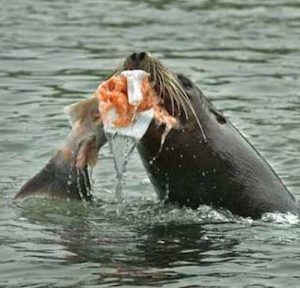
Pressure mounts for a seal harvest in B.C.
Pressure is mounting for a commercial seal harvest in British Columbia after the United States announced it will allow the killing of up to 920 sea lions a year in the Pacific North West to protect endangered wild fish stocks. The American lethal removal program, passed by Congress and signed into law by President Donald Trump last month, for the first time allows American native tribes to kill sea lions that are threatening endangered salmon and steelhead runs to extinction. Government authorities in Washington, Oregon, and Idaho are already allowed to lethally ,,, >click to read<
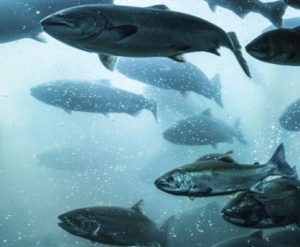
Russell Wangersky – Farmed Salmon: Left behind
It sometimes feels that we’re perpetually jumping onto a ship just about the same time as everyone else is abandoning it. And nowhere does it seem more like that than in the aquaculture business. As the plans steamroller ahead for a new massive Placentia Bay open pen Atlantic salmon project with the provincial government (and key regulator) fully onside, it’s hard to ignore that many others are moving in the other direction. In the state of Washington, a large-scale fish escape saw that state announce a ban on Atlantic salmon pen farming and a wind-down of existing operations. (The salmon aquaculture business in Washington is back under the microscope this month after 800,000 juvenile salmon had to be destroyed because they were found to be carrying a strain of Piscine orthoreovirus, which is dangerous for wild stocks of salmon.) >click to read<
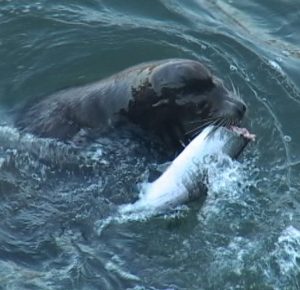
Solution to deal with B.C.’s sea lion surplus? Harvest them, group suggests
Sea lion populations have been on the rise for years and wreaking havoc on commercial fishermen’s catches and equipment, according to the Pacific Balance Pinniped Society. Adult male California sea lions can grow to as big as 800 pounds and consume massive quantities of fish as they grow. “Out in the waters and in our rivers, the pinniped populations have just exploded and we know they’re targeting mainly salmon, steelhead, trout and other fin fish species,” said Thomas Sewid. He believes seals and sea lions are over-abundant in B.C. waters and is spearheading a solution to deal with them. “Not just the natives want to start harvesting pinnipeds,” said Sewid. “This is an industry that can explode throughout coastal British Columbia.” >click to read<21:08
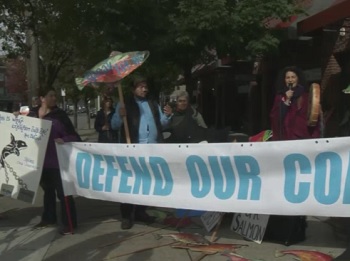
Protesters call for end to Chinook salmon fishing to save endangered orcas
Demonstrators concerned about the fate of the endangered southern resident killer whale population are calling for an end to all commercial fishing of Chinook salmon. There are just 74 of the southern residents remaining, and scientists say a lack of their primary food source, Chinook, is one of the key threats to their survival. On Wednesday, about a dozen protesters descended on Minister of Fisheries and Oceans Jonathan Wilkinson’s North Vancouver constituency office to call for change. Shirley Samples argued the government needs to ban all commercial and recreational Chinook fishing. “Why don’t we subsidize these fishermen? Why don’t we give them money so they can make it through this time when they have to forfeit fishing? There is a solution,”>click to read<10:20
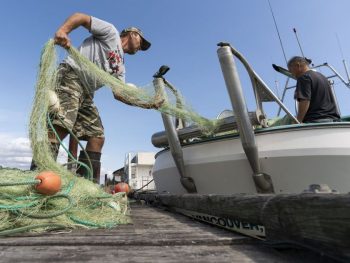
Fraser River sockeye salmon fishing bonanza to start next week
The Fraser River will open next week for its first sockeye salmon run of the season, in a year that is expected to bring in millions of fish for the first time in four years. For local fishermen, it’s better than Christmas. “Oh, we’re super excited,” said Richmond fisherman Roy Jantunen, hours after learning the Pacific Salmon Commission had announced a 24-hour opening from 7 a.m. Wednesday. Jantunen is preparing to go flat out for that full day, without any sleep, to maximize his catch. “It’s great news,” he said. “Last week, we were pulling out the nets and getting them ready. We haven’t used these nets in four years.” >click to read<08:08
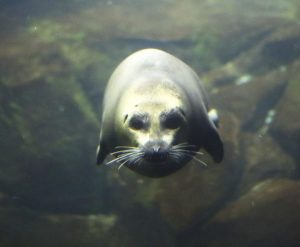
Hunters demand quota to cull thousands of seals and sea lions to save salmon population along B.C.’s coast
The Chief of Haida Gwaii First Nations is calling for a hunting quota on at least 3,000 seals and sea lions in his community and along the west coast of B.C. to help repopulate the critically low salmon stocks. The newly-established Pacific Balance Pinnipeds Society led by president and Chief Roy Jones wants Fisheries and Oceans Canada to establish an “annual harvest quota” on seals and seal lions. “It would be nothing to take probably 3,000 seals out Haida Gwaii, maybe 1,500 to 2,000 sea lions, because the populations are crazy up here,” said the 67-year-old Chief and retired fisherman who grew up watching his father and uncle hunt seals. >click to read<22:43
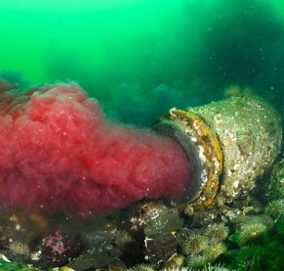
Fish Farm: Audit finds 70 percent of B.C. fish-processing plants do not comply with environmental regulations
An audit of British Columbia fish-processing plants sparked by gory video of a pipe spewing bloody water into the Salish Sea has found that more than 70 percent of plants audited are out of compliance with environmental regulations, and some operate under rules decades behind modern standards. Stronger measures are needed for the fish-processing industry, to ensure protection of the marine environment, including wild salmon, according to the audit of 30 fish-processing plants released Wednesday by the B.C. Ministry of Environment and Climate Change Strategy in response to controversy that erupted over the plume. >click to read<13:00
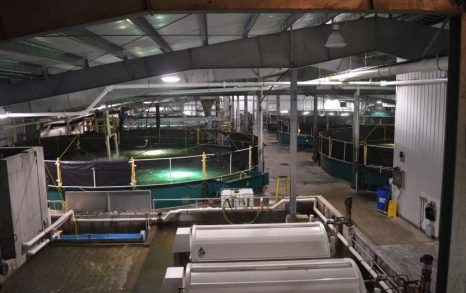
This Canadian First Nations group wants you to buy salmon raised on land
Alert Bay isn’t exactly a premier destination on British Columbia’s rugged Pacific Coast. On this winter day, there are more crows than people on the town’s wooden sidewalks, and most of the few small businesses near the waterfront are closed for the season. The biggest building is an abandoned salmon cannery, a reminder of what used to be here. It’s a past that Bill Cranmer remembers well.,, For centuries, he says, salmon sustained the Namgis’ lives and culture.,, Cranmer says if he and his Namgis First Nation people had their way, they’d get rid of open-water salmon farms. But they can’t, so they’re trying another idea for rebuilding a salmon economy for their community. They’ve built their own salmon farm — on land. >click to read<15:26

Washington senator wants B.C. to follow suit and phase out net-pen fish farms
A Washington senator says he wants to see British Columbia join the state in phasing out ocean-based Atlantic salmon farms when the province decides whether to renew farm leases in June. An American ban will be less effective in the shared ecosystem of the Salish Sea if fish farms continue to operate in Canadian waters, said Democrat Sen. Kevin Ranker. The Washington state senate and house of representatives have recently passed bills that would phase out net-pen farms when their leases come up for renewal over the next seven years. >click to read<14:06
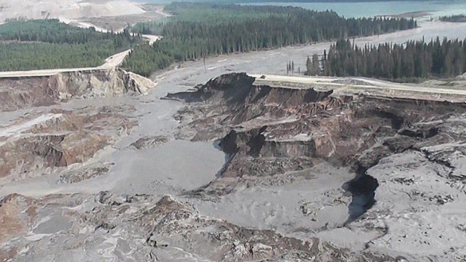
Still No Charges for the Company Behind Canada’s Largest Mining Spill
The company responsible for the Mount Polley mine spill—one of the largest environmental disasters in Canadian history—has found out it’s not going to face any charges in British Columbia. The news likely has billionaire Murray Edwards, owner of Imperial Metals and the Mount Polley mine (and the Calgary Flames) toasting with his rich friends in London (where he lives to avoid paying taxes). If you’re not in BC, there’s a chance the aerial images of the disaster haven’t already scarred you forever. This is what the collapsed tailings pond at the Mount Polley mine looked like in August 2014. >click to read< 16:55






